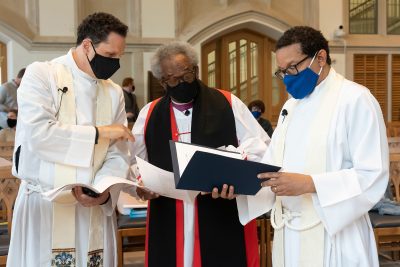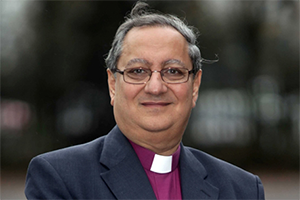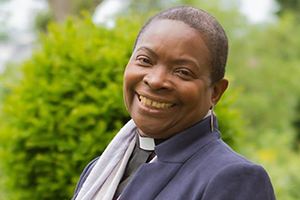International Event Promotes Cross-Cultural and Anti-Racist Ministry
The March 25 event featured The Most Rev. Michael Curry and an international panel of Anglican leaders.International Event Promotes Cross-Cultural and Anti-Racist Ministry
The March 25 event featured The Most Rev. Michael Curry and an international panel of Anglican leaders.
A recent Duke Divinity School event served as a call to re-center Christ in the lives of Christians and in churches as an essential requirement for building cross-cultural and anti-racist Christian ministry. The March 25 event, “A Symposium on Cross-Cultural and Anti-Racist Ministry for a Global Church,” featured The Most Rev. Michael Curry, presiding bishop of The Episcopal Church, USA, who gave the sermon during the morning worship service and was also featured in an international panel discussion on striving for justice and building bridges in ministry.
Bishop Curry, who was visiting the Divinity School for the first time since becoming presiding bishop, spoke in his sermon about spending time at the school during a sabbatical, studying Christian arguments for and against slavery. “I noticed an interesting pattern,” he said. Those who would defend chattel slavery “had a tendency to avoid the Jesus of the Gospels like the plague”, while those who argued for abolition “ran to Jesus like a savior.”
“The Church today is in danger of losing its soul,” said Bishop Curry. “If you look at this pattern and how it plays out again, it is when and where Jesus of Nazareth, his teachings, his example, his spirit, his living his life—when that is removed, Christianity ceases to be Christianity. It was true in chattel slavery, and it is true now. Because the truth is: if bigotry is your game, Jesus is not the name!”
Speaking to an audience that included Duke Divinity School students, Bishop Curry said, “I’m starting to realize that in our time, and I suspect in the time of the emergence of your ministries, one of the great evangelical tasks will be the re-evangelization of Christianity itself until the face of Christianity looks like the face of Jesus.”
Watch the sermon.

Professor Christopher Beeley, Bishop Curry, and Professor David Emmanuel Goatley speak before the morning service.
Panelists discussed challenges and opportunities for multicultural and anti-racist ministry in their unique contexts, and the need to bring marginalized groups to the center of church life and leadership. Bishop Anis acknowledged the difficulty in Egypt of getting many different ethnic groups, with different languages and different levels of marginalization, to see each other as one in Christ. Bishop Maiztégui Gonçalves spoke about the impact of the colonialist history of Brazil and its legacy of deep societal inequities on the church and their current work promoting interculturality and anti-racism. Bishop Hudson-Wilkin acknowledged the challenge in confronting negative perceptions of minorities in leadership, telling a story that took place in rural UK:
“I once asked a group of clergy and laypeople in a rural part of one of the dioceses in the UK, I said to them, ‘If you had a vacancy and I applied for it, would you consider me?’ A hand went straight up, and the response was, ‘We don’t have any Black people here, so why would we consider you?’ I remember literally just smiling, and I said, ‘Oh, how interesting. So white priests can go to Africa, white priests can go to our inner cities, white priests can go anywhere and minister to anyone, but Black priests can only go to places where there are Black people. How interesting,’ and left that for them to ponder.”
Watch the panel discussion.
“Conversations about racism and racial justice are critical for Christians,” said Goatley. “Assumed superiority of whiteness and imagined inferiority of Black, brown, indigenous and Asian heritage people has been disastrous to the Christian witness and deadly for vulnerable people globally for centuries. Beyond talking about the problems of racial injustice, however, our global conversation partners of bishops demonstrated how they and the churches they serve are doing the work of racial justice.”
Said Beeley, “The gathering was a moving witness to the power of Christ’s love for ‘every family, language, people, and nation,’ as we pray in our daily liturgy. That church leaders from four continents would come together in this spirit—it was very inspiring. I am deeply grateful to our colleagues from the Anglican Communion, and especially to Bishop Curry for joining us at this special event.”
The event highlighted for panelists the importance of the church in leading conversations, and how anti-racist ministry is a direct reflection and consequence of the gospel.
“It seems to me that the church has a significant role to play in healing the brokenness that is there in our world,” said Bishop Hudson-Wilkin. “But we cannot heal that brokenness if we ourselves do not recognize the brokenness in our midst and seek the God who is the great healer to heal that brokenness, to make us one so that we become the voice of the voiceless—not because we’re doing something politically correct, but because we have been inspired by the Holy Spirit to make a difference in God’s world, because that is God’s world out there.”
“We in the church must bridge those differences and bring people together in structured contexts where they won’t kill each other, but where real conversations between human beings who are all children of God can really begin to happen,” said Bishop Curry. “We must engage the interpersonal work, we must engage the structural work, and we must deal with the political and economic work.”
The event was sponsored by the Anglican Episcopal House of Studies and the Office of Black Church Studies.



